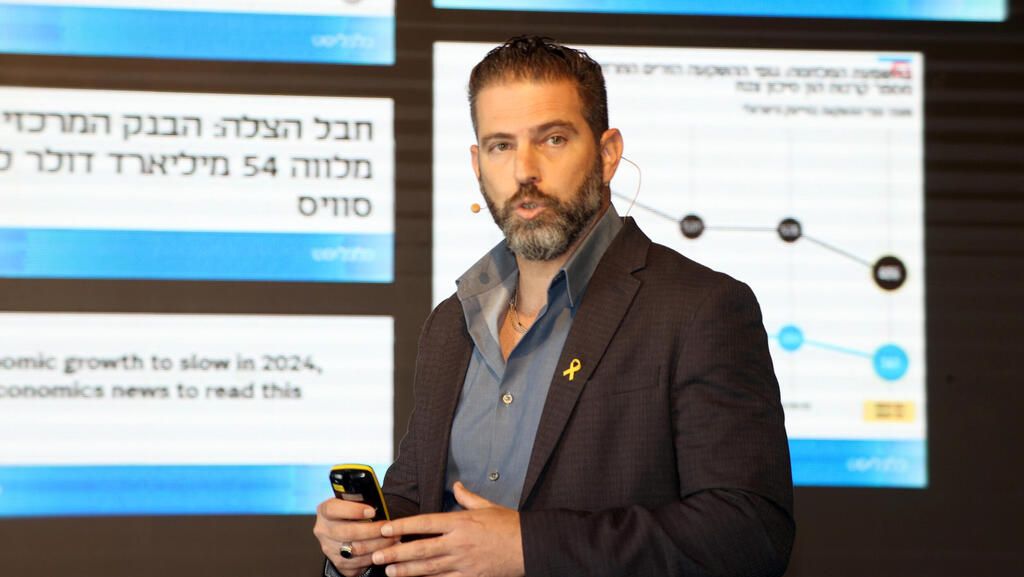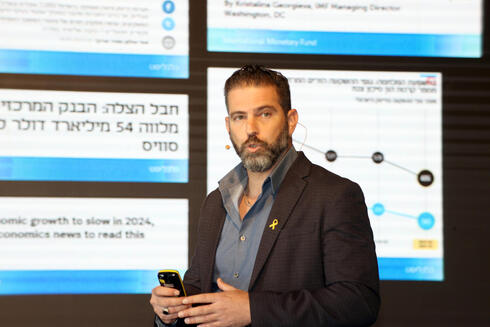
Microsoft Israel GM: "The road to resilience - cooperation between traditional industries and the tech sector"
Alon Haimovich, Israel Country General Manager at Microsoft Israel added that "the new normal is uncertainty - and it is here to stay." Haimovich also spoke about the risks of AI: "We see more and more cynical exploitation and misuse of this technology"
"I'm not here to broadcast pessimism," is how Alon Haimovich, Israel Country General Manager at Microsoft Israel, opened his remarks at Calcalist's Resilience Conference held in partnership with Phoenix earlier this week. "A look at the tech sector in Israel proves that we have been able to show business resilience, through exits, investments and international recognition."
Haimovich based his words on numbers: according to him, in the six months that have passed since October 7, more than $3 billion have been poured into Israeli tech. Over 200 fundraising rounds were carried out, with at least 9 exits of over $100 million being completed. "These are impressive figures and proof that the tech sector manages to show its business resilience," Haimovich said.
"The new normal is uncertainty, and it is here to stay," Haimovich added, "not only because of the geopolitical situation and not only since October 7." Haimovich discussed a report published by the World Economic Forum presenting the global risks that will afflict the world in the coming decade. Haimovich chose to focus on four risks: the development of artificial intelligence, the extreme weather changes that will lead to the fact that the demand for food and water will be greater than the supply, cyber attacks and the lack of trained personnel and skills suitable for the needs of the industry.
"I asked Microsoft AI to summarize the report for me and provide the bottom line: What do we need to do to deal with the risks that will befall us in the coming decade? The answer was unequivocal: the only way to prepare and emerge with resilience and a position of leadership is to take a collective stand by cooperating between the traditional industries and the tech sector and global companies."
Haimovich was amazed to find that the bottom line is the same as Microsoft Israel's strategy from two years ago, when the global slowdown began. "We wanted to build a strategy and we knew that we had to continue focusing on the traditional industries, both those that define the challenges and that would tell us what they need to produce the breakthroughs. Once we understood that, we would try to provide a domestic solution and also turn to the broad ecosystem of the tech sector and we will try to combine forces to produce a solution."
Haimovich gave as an example the health system, whose biggest challenge these days is to produce a breakthrough in personalized medicine. "We will provide domestic solutions, we will find the tech ecosystem that knows how to complete the picture and we will not only try to solve the problem, but to make the health system in Israel a global leader in personalized medicine. What is the role of Microsoft in this triangle? We are the ones who make it possible, mainly with the help of technology centered on artificial intelligence in additional business models."
"Artificial intelligence is amazing and creates endless opportunities," Haimovich added. "However, we are seeing more and more cynical exploitation and misuse of this technology. We have seen many deep fake attacks since October 7 that influence public opinion and attempts to use deep fake to influence elections in democratic countries. If we do not do something significant about this, it will soon meet us in other places.
"Microsoft, which has been leading the field of Responsible AI for 15 years, has established an infrastructure that brings together our partners from the tech sector, the technologies and the processes, such that in the end they will be able to identify the creation of the deep fake and know how to stop and deal with it so that already in the upcoming elections in the United States we will be able to give this transparency at any given time and create resilience for the voters.
"Another example is in the field of cybersecurity: the amount of attacks experienced by the State of Israel since February, mainly from Iran, has increased significantly. The types of attacks, the targets and the sophistication have changed, and on top of that is the challenge that organizations do not know how to deal with this cyber paradigm and are trying to integrate more non-integrative products. So we took artificial intelligence technology, asked all the data assets that exist in the organization about the nature of the attack and solved the problem of end-to-end visibility and the lack of manpower experts in cyber fields."
Related articles:
Haimovich touched on one of the biggest issues, a lack of skilled, high-quality personnel, and talked about the fact that in 2030 there will be a shortage of about 85 million developers in the United States, which could lead to economic damage of about $8.5 trillion. "To solve the problem, one of our artificial intelligence tools knows how to receive an instruction in natural language and generate a function that checks whether the password is wrong. The system knows how to build everything by itself and knows how to document, explain and do the QA (quality assurance) on itself."
Finally, Haimovich focused on the problem of manpower in the field of medicine and the user experience of the patients as a result of a lack of medical staff: "Together with the Sheba Medical Center and using artificial intelligence, we created the virtual psychiatrist, who knows how to make an initial diagnosis and convey the insight to the psychiatrist and the doctor in order to reduce the burden and make sure that God forbid they do not miss an extreme case."
